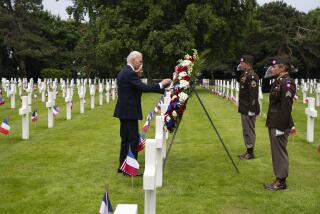We Cried and Remembered, Together
- Share via
“That’s a wonderful expression we hear all the time--Americans all together.” That was from Peter Jennings, born a Canadian. The ABC anchorman hosted a program Wednesday, “Answering Children’s Questions,” part of a daylong remember-athon. And I loved every minute of the whole fest.
The twin towers may no longer be standing, but for one more day, at least, Americans were all standing together. But like any bright shining moment, the feeling will fade as patriotism yields to partisanship and disillusionment.
What united us was the universality of Sept. 11. “They were our neighbors, our husbands, our children, our sisters, our brothers and our wives,” said New York Mayor Michael Bloomberg at ground zero. Indeed, the preferred style of public mourning these days is to remember each and every victim. And so it was that former Mayor Rudy Giuliani and nearly 200 other readers--politicians, celebrities, victims’ families--tolled through 2,801 names of those who died at the World Trade Center.
Across the nation, shrines were visited and dedicated. In San Francisco, memorializers laid out some 3,000 little flags on a lawn, under big banners reading “NYPD” and “FDNY.” In that city, Mark Bingham, the gay man remembered as one of the heroes of United Airlines Flight 93, has assumed a mythic status. “Out” gays and lesbians might not be allowed to fight in Afghanistan, but they can and did fight the terror war at home.
And that’s a further lesson in togetherness: All Americans are in this fight together, if only because most of the fatalities occurred on the first day, Sept. 11. Places where civilians died--North Tower, South Tower, E-Ring, Shanksville--now have the resonance of battlefields, alongside Lexington, Gettysburg, Omaha Beach.
But we keep a special place in our hearts for the firefighters who, in the emblematic act of Sept. 11, went running up when everyone else went running down. The A&E; network honored Battalion Chief Ray Downey, his two firefighter sons remembering him proudly. One said, “Nothing like running down a smoking hall with your dad.”
Yes, amid the warm pride it was a day for chills and goose-bumps. Cameras lingered over the shrines: the steel girder-cross found in the rubble, the sculptured sphere that survived nearly intact, the new eternal flame.
Mostly it was an occasion for thinking about what was gone. On MTV, Moby said that he once had a view of the trade center from his roof deck. Remembering that morning, he added: “For the first time in my life, I saw New York as vulnerable, as something to be cherished.”
Of course, if it’s honest and unironic emotion, then that’s the cue for country and western. And the twanging of steel guitars and invoking of simple emotions could be heard nationwide. Country Music Television got right to the point in its electronic programming guide: “Patriotic.” And definitely the kind of patriotism that unites. An old Charlie Daniels song, “In America,” was in rotation: “Cause we’ll all stick together/And you can take that to the bank/That’s the cowboys and the hippies/And the rebels and the Yanks.”
Most remarkable was another CMT tune, a Brooks and Dunn cover of the Youngbloods’ 1967 hit, “Get Together.” At the time, the lyrics to that song--”try and love one another right now”--were seen as anti-Vietnam War. That once-controversial context has been forgotten; the new mood is unity--cowboys and hippies loving the same country.
In addition to musical reconciliation, there was visual reconciliation. A loop of red, white and blue ribbon was seen not only on CMT but also on MSNBC. That looped-ribbon shape was first used by AIDS activists. Now it’s an American flag ribbon, for all of us, no matter who or what we are.
After Sept. 11, George W. Bush exemplified just that sort of earnestness, that heart-on-sleeve plain-spokenness. He emphasized tolerance as he visited a mosque, but he made it clear that we would find its future as one nation, not many. He was, in the words of A&E;, “the president who found his voice in the rubble.” And the people rallied to his blunt confrontation with “evildoers.” Yet, as ABC’s Claire Shipman observed Wednesday, “for a while, his moral clarity lined up with the world’s moral clarity. But the world has to some extent moved on.” She added: “It will be interesting to see how the president adapts to this change.”
It will indeed. The last year saw victory over the Taliban but not the capture of Osama bin Laden. And now the country’s security condition has worsened a notch--or a color. As the terror war enters its second year, Bush’s go-get-’em specificity is being lost in generality. In his speech at Ellis Island on Wednesday night, the president mentioned neither Bin Laden nor Al Qaeda. What was voiced instead were the unmistakable signs of “mission creep”--toward war with Iraq, away from the consensus of Americans, even further away from international alliance. In fact, Bush seemed to want to solve all the world’s problems, as when he said, “Ours is the cause of human dignity: freedom guided by conscience ... the hope of all mankind.”
It would be hard for anybody to argue with any of that, but of course what Americans want most is assurance of no more 9/11s.
In the meantime, as the first anniversary slips away, Americans can at least treasure the all-together unity of that tragic yet uplifting day. The memory of Sept. 11 will always be with us, haunting and inspiring, like mournful moonlight through the window.
More to Read
Sign up for Essential California
The most important California stories and recommendations in your inbox every morning.
You may occasionally receive promotional content from the Los Angeles Times.













